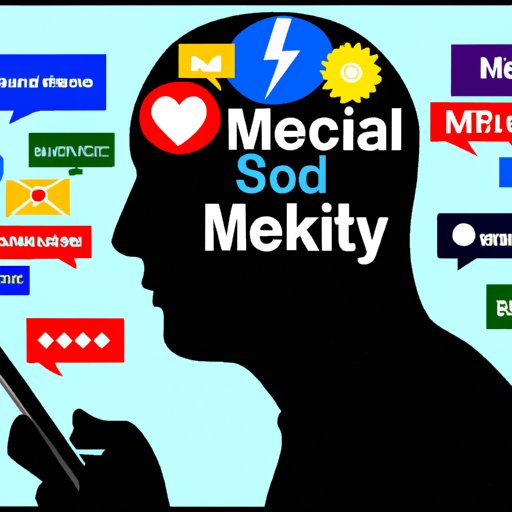Introduction
Social media has become an integral part of our lives. It provides us with a platform to connect with people from around the world, share news and updates, and stay informed about what’s happening in the world. However, there is a dark side to social media that can have a negative impact on our mental health. In this article, we will explore how social media can lead to mental health issues such as cyberbullying, self-esteem, anxiety, stress, addiction, depression, sleep deprivation, and loneliness.
Examining the Impact of Cyberbullying on Mental Health
Cyberbullying is defined as the use of digital technology to harass, threaten, embarrass, or target another person. It can take many forms, including sending offensive messages or images, spreading rumors, or posting hurtful comments online. Cyberbullying can lead to feelings of distress, depression, anxiety, and even suicidal thoughts.
The Effects of Social Media Comparison on Self-Esteem
Social media comparison is when someone compares themselves to others based on the content they see on social media sites. This can be especially damaging for young people who may feel inadequate due to the seemingly perfect lives they see portrayed online. Constant comparison to others can lead to low self-esteem, insecurity, depression, and anxiety.

How Social Media Can Increase Anxiety and Stress Levels
Anxiety and stress are normal responses to life’s challenges, but social media can exacerbate these feelings. The constant need to check notifications, compare ourselves to others, or keep up with the latest news can cause us to feel overwhelmed and anxious. Additionally, the fear of missing out (FOMO) can lead to feelings of stress and pressure to keep up with everyone else.

Exploring the Link Between Social Media Addiction and Depression
Social media addiction is when someone cannot control their need to constantly check their phone or be active on social media sites. This type of addiction can lead to feelings of guilt, shame, and isolation, which can ultimately lead to depression. Additionally, withdrawal symptoms such as irritability, restlessness, and anxiety can further contribute to depression.

Understanding the Role Social Media Plays in Sleep Deprivation
Sleep deprivation can occur when someone does not get enough quality sleep at night. The blue light emitted from screens can disrupt our natural circadian rhythms and make it harder to fall asleep. Additionally, the endless scroll of social media can cause us to spend too much time on our phones, leading to late nights and poor sleep.
Looking at the Correlation Between Social Media Use and Loneliness
Loneliness is a feeling of being disconnected or isolated from other people. While social media can help us stay connected to friends and family, it can also lead to feelings of loneliness. This is because we often compare ourselves to others, creating a sense of disconnection and inadequacy. Additionally, spending too much time on our phones can lead to reduced face-to-face interactions, further contributing to feelings of loneliness.
Conclusion
In conclusion, social media can have a negative impact on our mental health. From cyberbullying to low self-esteem, anxiety, stress, addiction, depression, sleep deprivation, and loneliness, it is important to be aware of the potential risks associated with excessive social media use. To improve your mental health, it is important to manage your social media use and make sure you are taking regular breaks from your devices.


